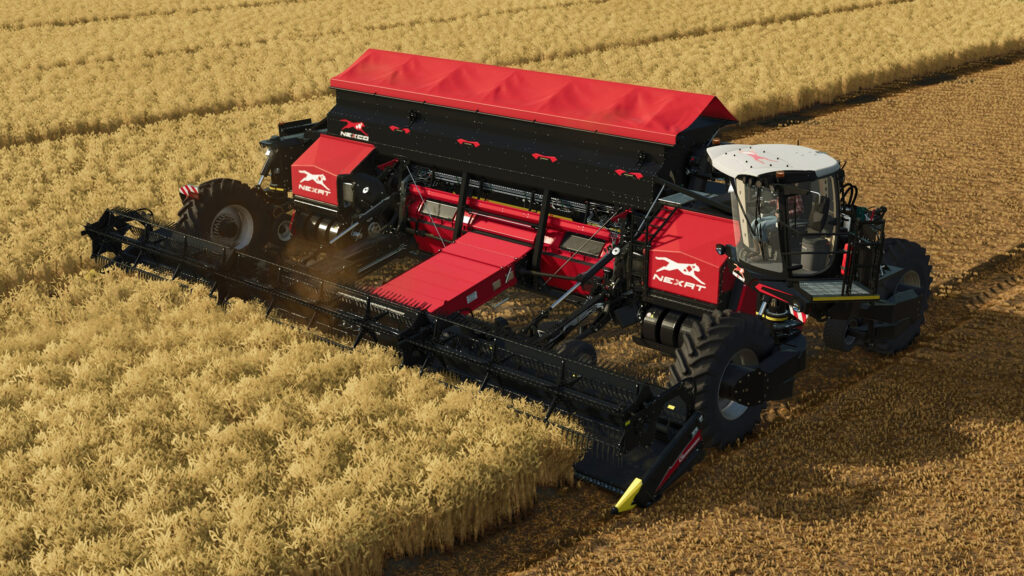You drop your settings to High. Frame rate stays locked at 45 FPS. GPU usage sits at 60 percent. One CPU core maxes out while the RTX 4080 waits idle. Welcome to the GIANTS Engine 10.
This guide shows the best Farming Simulator 25 settings for maximum FPS on PC. You will learn which settings destroy performance, how to fix the CPU bottleneck, why DLSS fails but FSR 3 Frame Generation works, and advanced game.xml tweaks that push draw distance beyond the UI limits.
Best Farming Simulator 25 Settings: Understanding the GIANTS Engine 10 Bottleneck
The single threaded CPU architecture explains why your RTX 4080 sits at 60 percent usage while FPS tanks.
CPU Bottleneck Symptoms
- 1One CPU core at 100 percent while others idle at 30 to 40 percent
- 2GPU usage stuck between 40 and 70 percent despite low FPS
- 3Micro stutter when entering new areas or AI workers activate
→ Lower draw distance and object counts
GPU Bottleneck Symptoms
- 1GPU usage at 95 to 100 percent consistently
- 2FPS increases significantly when lowering resolution or shadow quality
- 3DLSS or FSR upscaling provides 20 plus percent FPS boost
→ Lower graphics settings and enable upscaling
Quick Settings to Maximize FPS in Farming Simulator 25

Maximum FPS Priority
Complete Settings Breakdown for Maximum FPS
Performance Impact by Setting
| Setting Name | Max FPS Value | Performance Impact | Key Technical Insight |
|---|---|---|---|
| Texture Resolution | Low / Medium | High | Game uses 5 to 6 GB VRAM at 1080p. Essential for cards with less than 8 GB VRAM. |
| Texture Filtering | Anisotropic 16x | Negligible | Modern GPUs have zero performance cost. Never lower this setting. |
| Shadow Quality | Low | High | One of the most GPU intensive settings. Lower for large FPS gains. |
| Foliage Shadows | Off | Very High | Generates massive draw calls for individual plants. Disable for instant boost. |
| SSAO Quality | Off | Medium | Post process depth effect. Off for max FPS, Medium for balanced visuals. |
| Object Draw Distance | 70-100% | Very High | Heavily loads single CPU core. Primary cause of stuttering and low FPS. |
| LOD Distance | 70-100% | High | Controls object complexity at distance. Reduces pop in stutter when lowered. |
| Max Mirrors | 0 or 1 | Very High | Each mirror re renders entire scene. Doubles or triples rendering load. |
| Max Shadow Lights | 9 | Bug Related | Setting to 10 prevents Very High shadow quality from applying correctly. |
| Post Process AA | FSR 3 | FPS Boost | Enable Frame Generation for 40 to 100 percent FPS increase. |
FSR 3 Frame Generation vs DLSS vs DLAA Performance Comparison
Farming Simulator 25 includes multiple anti aliasing and upscaling technologies. Understanding when each one works and when they fail is critical for maximizing FPS.
- Compatibility All GPUs
- FPS Boost +40-100%
- CPU Bottleneck Works Great
- Input Lag Minimal
- Image Quality Good
- Compatibility RTX Cards
- FPS Boost 0-25%
- CPU Bottleneck Ineffective
- Input Lag Low
- Image Quality Excellent
- Compatibility RTX Cards
- FPS Boost +2%
- CPU Bottleneck N/A
- Input Lag None
- Image Quality Best
Hardware Tier Settings Profiles for Different Systems
8 GB RAM
16 GB RAM
32 GB RAM
Low Spec Profile Settings (GTX 1050 Ti / RX 470)
Core Graphics Settings
- Resolution: 1920×1080
- Texture Resolution: Low (Essential for 4 GB VRAM)
- Texture Filtering: Anisotropic 16x
- Shader Quality: Low
- Shadow Quality: Low
- Foliage Shadows: Off
- SSAO: Off
Distance and Objects
- Object Draw Distance: 70%
- View Distance: 70%
- LOD Distance: 70%
- Max Mirrors: 0
- Max Tire Tracks: 100%
Critical FPS Booster
- Post Process AA: FidelityFX Super Resolution 3
- FSR 3 Mode: Quality or Balanced
- FSR 3 Frame Generation: On
Mid Range Profile Settings (RTX 3060 / RX 6700 XT)
Balanced Quality Settings
- Resolution: 2560×1440
- Texture Resolution: High
- Shader Quality: High
- Shadow Quality: Medium or High
- Shadow Distance: Medium
- Foliage Shadows: Off
Distance Optimization
- Object Draw Distance: 125 to 150%
- Max Shadow Lights: 9 (Critical for shadow quality)
- Max Mirrors: 1
Anti Aliasing Choice
- Path A (Max FPS): FSR 3 + Frame Generation On
- Path B (NVIDIA RTX): DLAA for maximum clarity
High End Profile Settings (RTX 4080 / RX 7900 XTX)
Maximum Quality 4K
- Resolution: 3840×2160
- Graphics Profile: Very High / Ultra
- Max Shadow Lights: 9 (Essential for Ultra shadows)
- Foliage Shadows: On (if FPS target met)
- Object Draw Distance: 200%
Upscaling for 4K
- Post Process AA: DLSS (NVIDIA) or FSR 3 (AMD)
- Upscaling Mode: Quality
- Frame Generation: Optional (to push beyond 60 FPS)
Advanced Draw Distance
- Can push distance beyond 200% via game.xml edits
- RTX 4070/3080: LOD 3.0, Foliage 3.0
- RTX 4090/4080: LOD 4.0, Foliage 4.0
Advanced game.xml Configuration Tweaks
The game.xml file in Documents\My Games\FarmingSimulator2025 exposes advanced engine controls not available in the UI. These tweaks unlock performance monitoring, remove FPS caps, and extend draw distances beyond slider limits.
NVIDIA and AMD Driver Settings for Farming Simulator 25
Critical Shader Cache Setting
- Open NVIDIA Control Panel
- Manage 3D Settings > Program Settings
- Select Farming Simulator 25
- Shader Cache Size: 10 GB or 100 GB
V-Sync Configuration
- In game V-Sync: Off
- NVIDIA Control Panel V-Sync: Fast
Avoid GeForce Experience
- Do not use Optimal Settings feature
- May fail to detect FS25 or provide bad config
- Manual settings yield superior results
Radeon Software Settings
- Disable global Radeon Boost
- Disable HYPR-RX
- These features can conflict with in game settings
FSR 3 Priority
- Enable FSR 3 and Frame Generation in game
- This is the most powerful performance tool available
- Works on NVIDIA cards too
Update Graphics Drivers
- Always use latest drivers for FS25
- Day one drivers often have critical optimizations
- Check manufacturer website directly
Troubleshooting Stuttering and Low GPU Usage
Fixing Persistent Stuttering
Stuttering in Farming Simulator 25 has two primary causes. Shader compilation stutter happens during the first 10 to 15 minutes of gameplay after a fresh install, driver update, or settings change. The game compiles shaders on the fly as new objects and effects are encountered. This is a CPU intensive process that interrupts frame pacing. The solution is patience combined with the shader cache tweak.
Load into your save and play normally for 10 to 15 minutes. Drive around the map and encounter different vehicles and areas. The stuttering will be pronounced initially but gradually subsides as the shader cache populates. To prevent recurring issues, set NVIDIA Control Panel Shader Cache Size to 10 GB or higher. This provides persistent storage for compiled shaders, minimizing recompilation in future sessions.
CPU bound stutter persists after the shader cache burn in period. This type appears when entering dense areas, activating multiple AI workers, or when the engine loads distant LODs. The CPU main thread cannot keep up with the game logic and draw call submission. The solution is lowering CPU intensive settings. Reduce Object Draw Distance, View Distance, and LOD Distance sliders to 70 to 100 percent. This cuts the number of objects the CPU must track per frame, directly alleviating the bottleneck.
Understanding Low GPU Utilization
Many users observe low frame rates while monitoring tools show GPU usage at only 50 to 70 percent. This creates confusion and leads to assumptions of broken hardware or poor optimization. The reality is neither. This is the visible symptom of a CPU bottleneck in a single threaded game engine.
The GPU renders frames as fast as the CPU delivers rendering commands. When one CPU core is maxed out processing game logic, it cannot feed the GPU fast enough. The GPU spends significant time idle, waiting for the next frame instructions. This is not a GPU problem. Upgrading the graphics card will not increase FPS in this scenario. The performance ceiling is set by the CPU, not the GPU.
Software solutions involve lowering CPU intensive settings as described above. Hardware solutions require upgrading to a CPU with superior single threaded performance, meaning higher clock speeds and higher IPC. This is the only hardware upgrade that meaningfully increases performance when CPU bottlenecked in Farming Simulator 25.
Conclusion
Farming Simulator 25 performance is dominated by two factors. The GIANTS Engine 10 single threaded CPU architecture creates a bottleneck that no GPU upgrade can solve, and FSR 3 Frame Generation bypasses this limitation to provide massive FPS gains. Start by enabling FSR 3 with Frame Generation for an instant 40 to 100 percent boost. Lower Object Draw Distance to 70 to 100 percent to reduce CPU thread stress. Disable Foliage Shadows for another large gain. Set Max Shadow Lights to 9 to fix the shadow quality bug. Configure NVIDIA Shader Cache to 10 GB or higher to eliminate compilation stutter. These steps address the root causes of poor performance and deliver smooth gameplay across all hardware tiers.
FAQ
What are the best settings for Farming Simulator 25 FPS
Enable FSR 3 Frame Generation, lower Object Draw Distance to 70 to 100 percent, disable Foliage Shadows, set Max Mirrors to 0 or 1, and set Max Shadow Lights to 9. These settings provide the largest FPS gains by reducing CPU bottleneck and GPU load.
Why is my GPU usage low in Farming Simulator 25
The GIANTS Engine 10 is single threaded and CPU bottlenecked. One CPU core maxes out processing game logic while the GPU waits idle for rendering commands. This causes low GPU usage despite low FPS. Upgrading the GPU will not help. Lower CPU intensive settings like draw distance or upgrade to a CPU with better single core performance.
Does DLSS work in Farming Simulator 25
DLSS provides minimal FPS gains in most scenarios because the game is CPU bottlenecked, not GPU bottlenecked. DLSS reduces GPU workload but the GPU already has spare capacity. Use FSR 3 Frame Generation instead, which bypasses the CPU bottleneck and provides 40 to 100 percent FPS boost.
How do I fix stuttering in Farming Simulator 25
Set NVIDIA Shader Cache Size to 10 GB or higher in Control Panel to prevent shader compilation stutter. Lower Object Draw Distance, View Distance, and LOD Distance to 70 to 100 percent to reduce CPU bottleneck stutter. Play for 10 to 15 minutes after settings changes to populate the shader cache.
What is FSR 3 Frame Generation in FS25
FSR 3 Frame Generation inserts interpolated frames between real rendered frames, effectively doubling FPS without requiring the CPU to process additional game logic. This bypasses the single threaded CPU bottleneck and provides 40 to 100 percent FPS boost. Works on all GPUs including NVIDIA cards.
Should I set Max Shadow Lights to 10 in FS25
No. Setting Max Shadow Lights to 10 triggers a bug that prevents Very High and Ultra shadow quality from applying correctly. The engine defaults to Medium quality instead. Set this to 9 to allow maximum shadow quality settings to work properly.
How much VRAM does Farming Simulator 25 need
The game uses 5 to 6 GB of VRAM at 1080p maximum settings. GPUs with 4 GB VRAM like GTX 1050 Ti experience severe stuttering and texture thrashing. Lower Texture Resolution to Low or Medium on cards with less than 8 GB VRAM to prevent performance issues.
What CPU is best for Farming Simulator 25
CPUs with high single core clock speeds and high IPC perform best. AMD Ryzen 7 7800X3D and Ryzen 9 7950X3D with large L3 cache are excellent choices. Intel Core i7 13700K and i9 13900K also work well. Core count matters less than single thread performance for this engine.
Can I edit game.xml to increase draw distance
Yes. Edit Documents\My Games\FarmingSimulator2025\game.xml and change viewDistanceCoeff, lodDistanceCoeff, and foliageViewDistanceCoeff from 2.0 to 3.0 or 4.0. This extends draw distance beyond the in game 200 percent limit but causes brutal performance impact and severe stuttering on most systems.
Why does Farming Simulator 25 run poorly on high end PC
The GIANTS Engine 10 is single threaded and CPU bottlenecked. Even RTX 4090 systems experience low FPS because the game cannot utilize modern multi core CPUs efficiently. One CPU core processes all game logic while the GPU sits idle. Enable FSR 3 Frame Generation and lower draw distances to work around this architectural limitation.






 Discord
Discord
 Instagram
Instagram
 Youtube
Youtube
 TikTok
TikTok